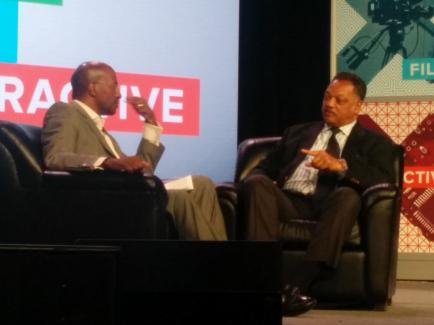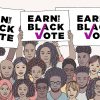By: Julie Walker

Jackson said that while the 1965 march was a major moment in the struggle to get blacks the right to vote, the new challenge will be opening up access to technology and Silicon Valley.
“Voting has its place, but the fastest-growing industry, I believe, is high tech, so we need to get in there,” he said. “We must make access to technology and this new machinery a crusade for everybody, not just a campaign for the few.”
Jackson has been instrumental in convincing major technology companies to release their diversity figures, which have shown that on average, just 2 percent of their workforce is black.
When #YesWeCode founder Van Jones, who moderated the conversation with Jackson, asked how many in the SXSW audience knew that the veteran activist has been pivotal in making this happen, very few people raised their hands.
How Jackson went about getting companies to cooperate illustrated a new way of taking protest from the pavement to the boardroom, he explained.
“The magic is going from a protester to a shareholder,” said Jackson, whose organization the Rainbow PUSH Coalition bought shares in tech companies to push for change from the inside.
“Ours was a social-justice agenda to change the conditions,” he said. “The argument that we made was not so much of a negative one but of a value-added argument.”
And Jackson hasn’t just been giving speeches; he’s getting action, Jones said. Just last week, Apple became the third tech companythis year to announce a donation of funds to help increase the number of women and people of color in the tech industry. Apple is committing $50 million to the cause.
In January, Intel announced a gift of $300 million, and in February Google donated $775,000 to Code2040, a nonprofit organization dedicated to helping women and minorities find tech jobs.
Jackson pointed out that blacks can be just innovative as whites and have been demonstrating this since the beginning of time.
“We can turn garbage into energy,” Jackson said. “Everyone has a place if you make room for them.”
He also wants to start an “underground railroad,” from Oakland to San Francisco, with the idea being to provide more inner-city black youths access to Silicon Valley.
Jackson said, however, that members of the black community have to do their part in forging their destiny in the tech world. “I don’t think we are doing as [well] right now as we should because people tend to be what they see,” Jackson said. “They don’t see it; they don’t want to be it.”
Technology must be taught in school, talked about at home and popularized through music, Jackson declared.
“It’s not just about being locked out; it’s about charging to open the door,” Jackson said, adding that it’s about not only opening the door but also being able to go through when it does open. Jones said that the Department of Labor is projecting a 1 million-worker shortfall (pdf) in the tech industry. (Some, however, dispute that number.)
“If you start telling African-American and Latino and Native American grandmamas alone that their grandkids can make $70,000 a year if they work hard and study well for just six months, you’re not going to have a problem in terms of people wanting to be part of this,” Jones said.
He and Jackson are also pushing for big tech companies to start recruiting from HBCUs, not just from the usual feeder schools like the Massachusetts Institute of Technology and Stanford.
Students from historically black colleges are just as qualified and should not be overlooked, Jackson said, adding, “Whenever the playing field is equal, we can make it.”
Julie Walker is a New York-based freelance journalist. Follow her on Twitter.
Like The Root on Facebook. Follow us on Twitter.















